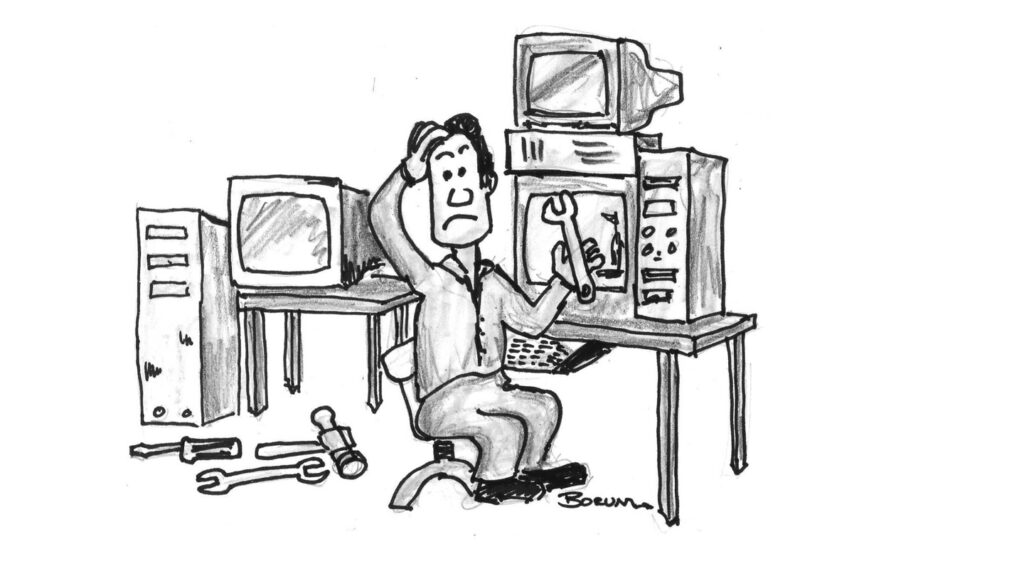
 It may be a shock to younger people, but in the past cars weren’t controlled by computers. In fact, there are still huge numbers of vehicles on the road that have no computer chip in them at all. When spark plugs fired, the right time was decided by a very mechanical device that was made for that purpose. The gasoline was measured by another mechanical device. Nowadays, a little silicon chip scratches its head and thinks about each of those events and decides exactly what is needed. It takes into account the temperature, the chemicals in the gas, how hard the motor is working, and even how the driver likes to drive. That little computer chip comes up with a magic formula to make everything work correctly — and it makes decisions faster than any human can think. It can even change that formula every second if it needs to. It really is a fantastic development. Somewhere, though, in my high school science classes, I remember one little detail. That detail is that for everything gained, something is lost. Nothing happens without some consequence — and it isn’t always good.
It may be a shock to younger people, but in the past cars weren’t controlled by computers. In fact, there are still huge numbers of vehicles on the road that have no computer chip in them at all. When spark plugs fired, the right time was decided by a very mechanical device that was made for that purpose. The gasoline was measured by another mechanical device. Nowadays, a little silicon chip scratches its head and thinks about each of those events and decides exactly what is needed. It takes into account the temperature, the chemicals in the gas, how hard the motor is working, and even how the driver likes to drive. That little computer chip comes up with a magic formula to make everything work correctly — and it makes decisions faster than any human can think. It can even change that formula every second if it needs to. It really is a fantastic development. Somewhere, though, in my high school science classes, I remember one little detail. That detail is that for everything gained, something is lost. Nothing happens without some consequence — and it isn’t always good.
Recently, I had a car problem. It wouldn’t be a big deal in the old days. Any mechanic worth his salt would track down and evaluate each component until he found the problem. But oh, it doesn’t seem to work that way anymore. Now there is a diagnostic ritual that must be followed. It involves using another computer (of course) to find the problem. After going through a scan of the symptoms, computer B (in the shop) will supposedly tell what computer A (in the car) has to say. Then computer B will suggest what the mechanic should do. As long as computer A has the correct information and computer B comes to the correct conclusion, all is well. There are some things that can go wrong, however. Computer A may get the wrong information if something in the car malfunctions. Then the conclusion of computer B would also be wrong because computer A didn’t get good data. Now if computer B has any doubts, it may give the mechanic several options — from replacing a sensor to replacing the whole stinkin’ engine. But the plot thickens. If something is wrong in the car it may not even report to its computer, in which case the computer either doesn’t have any idea that anything is wrong, or focuses on something that has nothing to do with anything.
I know, it’s all very confusing. The worst part is that the mechanic is relying on guidance from an inanimate object that can supposedly make decisions for us. In the old days, he could put his hand on the motor and tell if it was overheating. He could listen for squeaking or knocking, or look and smell for leaking fluids — things that the computer just isn’t good at. So, it still comes down to using human senses to find a problem. The only thing is that the thousands of dollars’ worth of equipment must be paid for, so the mechanic gets ten bucks and the computer needs ninety. At least a mechanic can go spend his ten bucks getting a cheeseburger and fries and iced tea for lunch, while the computer’s money goes straight to the people who made it and also made the computer that is in the car. Hmmm — seems a bit self-serving, don’t you think?
I guess I’m all for the old ways of doing things — where a human uses brainpower, fixes the problem, gets paid, and gets to eat and buy stuff for his family. I love old time mechanics. And by the way, my car problem is still a problem. It seems that something somewhere is wrong, but no human has been allowed to figure it out yet. Like my science teacher said, “There is no such thing as a free lunch.” To which I’d add, “There is no such thing as lunch without a computer involved somewhere along the way — and it’ll cost three hundred bucks more.”




